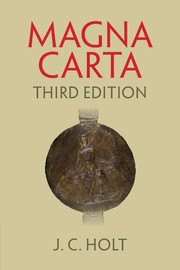Book contents
- Frontmatter
- Dedication
- Contents
- List of plates
- Preface to third edition
- Preface to second edition
- Preface to first edition
- Acknowledgements
- Abbreviations
- Introduction
- 1 The Charter and its history
- 2 Government and society in the twelfth century
- 3 Privilege and liberties
- 4 Custom and law
- 5 Justice and jurisdiction
- 6 Crisis and civil war
- 7 Quasi Pax
- 8 The quality of the Great Charter
- 9 The achievement of 1215
- 10 From distraint to war
- 11 The re-issues and the beginning of the myth
- Appendices
- References
- Index
- Plate section
8 - The quality of the Great Charter
Published online by Cambridge University Press: 05 July 2015
- Frontmatter
- Dedication
- Contents
- List of plates
- Preface to third edition
- Preface to second edition
- Preface to first edition
- Acknowledgements
- Abbreviations
- Introduction
- 1 The Charter and its history
- 2 Government and society in the twelfth century
- 3 Privilege and liberties
- 4 Custom and law
- 5 Justice and jurisdiction
- 6 Crisis and civil war
- 7 Quasi Pax
- 8 The quality of the Great Charter
- 9 The achievement of 1215
- 10 From distraint to war
- 11 The re-issues and the beginning of the myth
- Appendices
- References
- Index
- Plate section
Summary
Historians have debated long and hard about the quality of Magna Carta. The debate has not been about that alone, but also about the origins of the Charter and the character of the men who produced it. This necessary attempt to carry the argument outwards into broader fields has contributed to some confusion in which assessments of the Charter and assessments of the men who were involved have been used to determine the problem of origin and responsibility. On this Stubbs's attitude was certain, clear and consistent. For him Magna Carta was the greatest single formative document in English history, and he was under no doubt that the barons of the opposition were in the main responsible for it: ‘Who were the barons that now impose limits on royal tyranny, and place themselves in the vanguard of liberty? How have they come to sit in the seats and wield the swords of those whom so lately we saw arrayed in feudal might against king and people?’ As to their character Stubbs was in no doubt: ‘The barons maintain and secure the right of the whole people as against themselves as well as against their master’ their demands ‘were no selfish exaction of privilege for themselves’ they had ‘cut themselves loose from Normandy and Norman principles and reconciled themselves to the nobler position of leaders of their brother Englishmen’.
These views were at first accepted by Tout, for whom Robert fitz Walter was ‘the first champion of English liberty’, but most historians of Tout's generation showed increasing doubt. Stubbs's approach lay open to a double attack, first against his attitude to the Charter and secondly against his attitude to the baronage. The earliest critics followed both lines of argument.
- Type
- Chapter
- Information
- Magna Carta , pp. 232 - 253Publisher: Cambridge University PressPrint publication year: 2015



